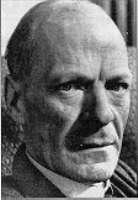
Kinda nasty looking, huh? Just like the kind of evil uncle who would tell you there is not such thing as the soul, or the mind, for that matter. Gilbert Ryle was the father of the school of philosophy of mind called Logical Behaviorism, which was all the rage for a while, which pointed out the rather obvious error made by Descartes that the act of perception necessitated the concept of a perceiver. Actually, that was Wittgenstein, I'm told. What Ryle pointed out was that the concept of the mind was a catergory error, which means (if I can distill the philosophical jargon) that language, which is a tool and perhaps the existence of the rational mind, uses concrete things and actions (nouns and verbs) to create poetic images, then treats the images as real things to explain concrete events. Role's theories seem to me basically to be a polemic against abuse of language.
Now as a Zen student I believe that there is no soul and no mind. This is after all the teaching of the Heart Sutra. Just kidding, although it's true. Of course there is a soul, and there is a mind. It's all a matter of perspective. If you want to see the best expression of relativity in spiritual matters, look at the Nishijima/Cross translation of Dogen's Shobogenzo (stick to Vol. 1). Dogen says what there is and is not, then blatantly contradicts it. A little clarity reveals that Dogen is not contradicting himself, but rather pointing out the limits of the rational mind as expressed by language. In fact, my perception is that the mind is rational thought, which is language, which is that nasty internal monologue that keeps you up all night.
But the problem is that it seems to us that there is a mind, that there is a soul, when we think about it in language. Because what has thoughts? What is born and dies? Nevertheless when we contemplate and search for the mind, there is nothing there. We cannot get thru the smokescreen of the internal monologue to see the self. Why?
Isaac Asimov posited as one of his laws of robotics that no system can understand itself. It is obvious that this is true of human beings, or the human mind. Although it might be useful for us in limited contexts to posit the existence of a mind, we cannot understand ourselves with the mind any more than Asimov's robots could program themselves (I know, I know, today's computers can program themselves but only to a limited extent, and there still is no true AI. Would one defeat this argument? I'll pass on that until it happens).
I always thought that the idea that man could understand God was the ultimate insult to God. If there were such a necessary first mover, could the limited mind of man, which evolved to build pyramids and arks, understand Him? The concept of God is an insult to Him. And if man cannot conceive God, why talk about Him or pretend we know what His rules are? The purpose of the conception of God was the creation of a Priesthood, and his continued existence is due to our reluctance to take responsibility for our own existence.
Someone asked the historical Buddha if there was life after death, and he said, to of course paraphrase, that's a red herring, search right now for your own enlightenment. Someone asked Dogen the same question, and he said, " I don't know." They said, "What do you mean you don't know, aren't' you a Zen priest?" He said, "Yes, but I'm not a dead Zen priest."
So, I'm sorry, Dalai Lama, reincarnation justifies your position and therefore you have to believe in it. But I don't believe it's a necessary or even a valid part of Buddhism. And you are a courageous man as we know fro your life history, but you need to take the one further courageous step that Krishnamurti took, and realize that the laws of the universe are unknowable. The best you can do is to know yourself, and that is the work of a lifetime. Or of the present moment.
No comments:
Post a Comment